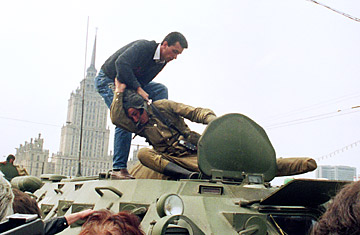
A pro-democracy demonstrator fights with a Soviet soldier on top of a tank parked in front of the Russian Federation building on August 19, 1991 after a coup that toppled Soviet President Mikhail Gorbachev.
(2 of 2)
"So it should be clear why the authorities ignore this holiday," says Lev Ponomaryov, one of Russia's leading human-rights defenders. "The main force behind the military junta in 1991 was the KGB, and the people in power are graduates of this very system. Why should they celebrate what was for them a defeat?" Indeed, in one of his most quoted remarks, Putin once called the fall of the Soviet Union "the greatest geopolitical tragedy of the 20th Century."
Many Russians now seem to agree. In a survey released last week by the Levada Center, only 10% of respondents said the collapse of the Communist putsch was a victory for the forces of democracy, and almost half said the events set the country on the wrong path. Perhaps even more disturbing, the majority of Russians do not remember much about what happened. A separate survey conducted by the state-run pollster VTsIOM found that up 72% of respondents could not name any of the political figures who took part in the Communist putsch. Hardly a quarter believed that Yeltsin, the leader of the resistance, had fought against it.
"We seem to be living in a memory void... a period where parts of history are simply blacked out," says Gennady Burbulis, who was Yeltsin's secretary of state after the Soviet Union dissolved. One of the great mistakes of Putin's political party "is to act as though the people's consciousness should not be stimulated, and should on the contrary be sedated," Burbulis says. "We have no culture of national memory."
As a consequence, the events of August 1991 have been taken up in recent years by Russia's opposition, which has made them the center of its democratic narrative. On Monday evening, Ponomaryov, the human rights activist, led a march to Moscow's Pushkin Square, where a makeshift stage flew a banner with the words: "Twenty Years Since the Peaceful Democratic Revolution." But the enormous crowds that had taken part in that revolution were nowhere to be seen. About 300 people showed up, most of them elderly intellectuals surrounded by a cordon of riot police. By sundown they had peacefully dispersed.
Smirnov, the historian, was meanwhile finishing another day at his exhibit, which was still attracting only what he called "the dregs of the intelligentsia." These were same people, he says, who had taken part in the demonstrations in 1991 and had stood in lines in the late 1980s to attend exhibits on Soviet history. At the time, Gorbachev's policy of glasnost, or openness, had just allowed the country's first honest look at its past, and historical museums had begun staging exhibits on the Gulag prison camps and the Stalinist purges of the 1930s. "Hordes of people stood in line for hours to get in," Smirnov says. "They were exhilarated. They felt themselves emerging from a state of ignorance about their past." But whether by choice or by design, that is where many have now returned.
